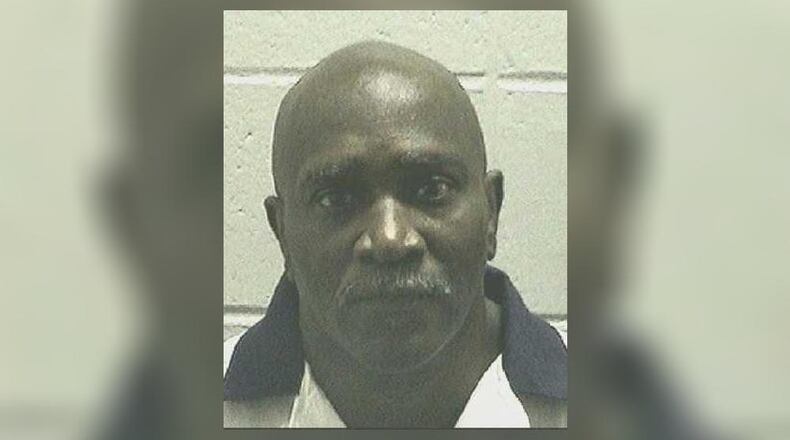The U.S. Supreme Court on Tuesday evening issued an extraordinary stay of execution more than three hours after condemned killer Keith Tharpe had been scheduled to be put to death by lethal injection.
Tharpe, 59, had already eaten what was supposed to be his last meal and had recorded a final statement. Here are five things you should know about this unusual case.
1. The crime: After his wife left him in 1990, Tharpe made repeated threats of violence. This led to Tharpe's being ordered not to have any contact with his wife or her family.
On the morning of Sept. 25, 1990, Tharpe intercepted his wife and her sister, Jacquelyn Freeman, as they headed to work in Macon. Tharpe, driving a pickup truck, blocked their car on a roadway in Jones County.
Apparently on drugs and armed with a shotgun, Tharpe ordered Freeman out of the car and shot her multiple times, killing her. He drove off with his wife, parked on the side of a road and raped her, court records say. He then drove her to Macon and told her to take money out of her credit union account. Instead, she called police.
2. The trial and a juror: Tharpe went to trial a little more than three months after his arrest — a short span of time unheard of today for a defendant facing a capital prosecution. After finding Tharpe guilty of murder and kidnapping, the jury sentenced him to death on Jan. 10, 1991.
Seven years later, Tharpe’s lawyers interviewed Barney Gattie, one of the jurors. Gattie soon signed a sworn statement, in which he said, “After studying the Bible, I have wondered if black people even have souls.”
Freeman, the murder victim, came from a family of “nice black folks, ” Gattie said. “If they had been the type Tharpe is, then picking between life and death for Tharpe wouldn’t have mattered so much. My feeling is, what would be the difference?”
Gattie, who is now deceased, also used a racial slur referring to Tharpe, the affidavit said.
Soon after Gattie made those incendiary statements, he recanted them.
“I believe Keith Tharpe was a cold, calculated murderer,” Gattie said in a newly signed, second affidavit prepared by state attorneys. “I did not vote to impose the death penalty because he was a black man.”
Gattie said he had been drinking beer and whiskey the day he signed his first affidavit, and many statements “were taken out of context and simply not accurate.”
But members of Tharpe’s legal team who obtained Gattie’s initial statement countered with their own sworn affidavits. Gattie did not appear to be impaired and was alert and animated, attorney Laura Berg wrote. And, Berg said, as they slowly read Gattie’s back statement to him, he said, “That’s right” and “I’m sticking to my story.”
3. Judges begin to take notice: As Tharpe's latest appeals made their way through the state and federal courts this year, a number of jurists expressed alarm at the juror bias claim.
When a three-judge panel of the federal appeals court in Atlanta recently said it would not consider Tharpe’s appeal, Judge Charles Wilson wrote, however, that Tharpe had “made a substantial showing of the denial of a constitutional right.”
Days later, the Georgia Supreme Court, in a 6-3 decision, also declined to hear Tharpe’s appeal.
It was not surprising that Justices Carol Hunstein and Robert Benham, two of the court’s more liberal members, were among those who disagreed with the majority’s vote to allow Tharpe’s execution to proceed. But it was noteworthy that Hunstein and Benham were joined in dissent by Harold Melton, one of the court’s more conservative justices.
4. The Supreme Court halts the execution: Chief Justice John Roberts, a reliably conservative vote, joined justices Anthony Kennedy, Stephen Breyer, Ruth Bader Ginsburg, Sonia Sotomayor and Elena Kagan in granting Tharpe a temporary stay of execution. Their decision said the stay "shall terminate automatically" if the court decides not to hear Tharpe's appeal. Justices Clarence Thomas, Samuel Alito and Neil Gorsuch dissented.
5. What happens next: The high court has three options: the justices can decide not to hear the appeal, meaning the execution would be rescheduled; they can agree to hear the case, which would likely require legal briefs to be filed and oral arguments; or they could send the case back to the lower courts with instructions on how to proceed next.
About the Author
The Latest
Featured



